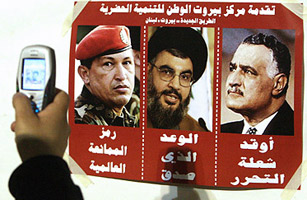
What do a small south Texas cable company, a suburban Virginia cable provider and Web-hosting servers in Delhi, Montreal, Brooklyn and New Jersey have in common? Since fighting broke out in Lebanon, they all have had their communications portals hijacked by Hizballah. Hackers from the militant Lebanese group are trolling the Internet for vulnerable sites to communicate with one another and to broadcast messages from Al-Manar television, which is banned in the U.S. In the cyberterrorism trade it is known as "whack-a-mole" — just like the old carnival game, Hizballah sites pop up, get whacked down and then pop up again somewhere else on the World Wide Web.
"As the Israelis tighten the noose on Hizballah in Lebanon, these communication nodes become critical," said Fred Burton, a former U.S. counterterrorism official and now vice president of Stratfor, a security consulting and forecasting company in Austin, Tex. In today's asymmetrical warfare, the Internet is vital to groups like Hizballah who use it to recruit, raise money, communicate and propagandize, Burton said, including transmissions from Hizballah leader Sheikh Hassan Nasrallah.